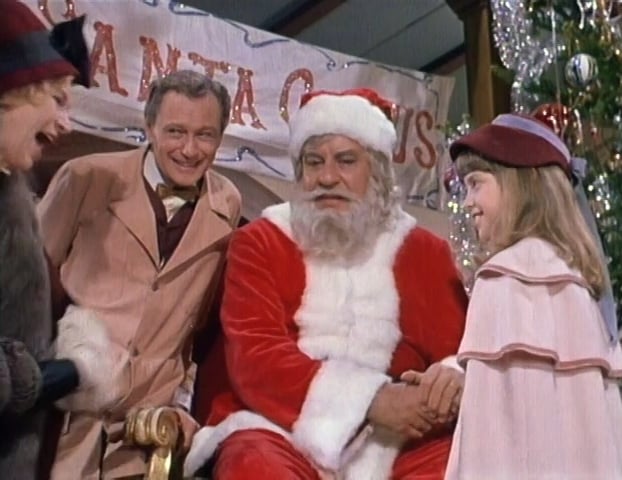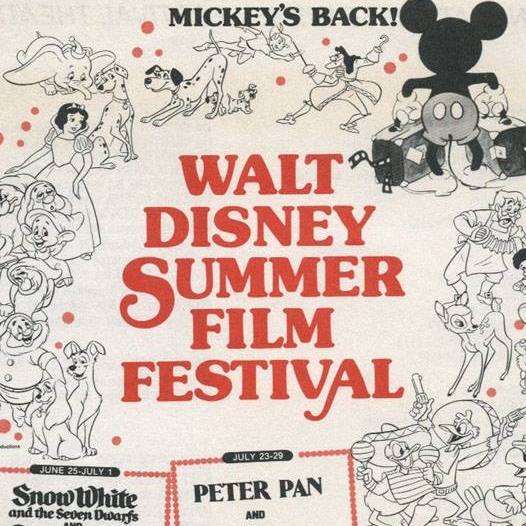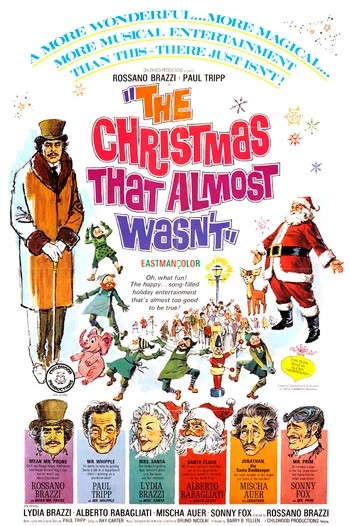A song a day keeps the coronavirus blues away:
In the 1960s there were Saturday and Sunday matinees for kiddie flicks, and it became something of a small market that existed into the 70s. One company named Childhood Productions run by producer Barry Yellen took European films, dubbed them into English, and adapt the edit of the film to fit into a more American format. They had done several of these, and actor/composer/writer Paul Tripp was a founder of the company, working for them in doing narration, etc.
Childhood Productions would make one original production that was released in 1966, the children’s film “The Christmas That Almost Wasn’t”. It was shot in Italy with a mostly Italian cast, and a few American actors. The film was made without sound, and everything post synched in the dubbing process, like many Italian films of the time.
Paul Tripp plays Sam Whipple, a lawyer who tries to help Santa Claus (Alberto Rabagliati), Mrs. Claus (Lydia Brazzi), and Santa’s elves when they are going to be evicted from their home in the North Pole by a Scrooge-like character named Phineas T. Prune (Rossano Brazzi). Santa goes to work at a department store run by Mr. Prim (Sonny Fox, the early 60s host of “Wonderama”), trying to raise money, but Mr. Prune will not go down without a fight.
“The Christmas That Almost Wasn’t” is purely a kiddie film, and in some ways not a particularly good one, but it does have its charms. The “special effects” are awful, and the film is very cheaply made, but the cast tries, despite some awful aspects of the script.
Paul Tripp is charming, and has an aura about him that makes him like a Mr. Rogers type of performer, something he’d been doing for a long time on television and on stage for children. The character of Sam Whipple he’d done for some time, appearing in two episodes of the classic sci-fi/horror show “Tales Of Tomorrow” “Ahead Of His Time” and “Double Trouble”, episodes that he also wrote, acting opposite his wife Ruth Enders Tripp, who also appears in “Christmas”. He wrote and sang the popular “Tubby The Tuba”, which eventually was made into an animated film. Their son David Tripp also appears in the film as the tall kid who tells Sam Whipple that Christmas can’t come every day just before singing “Why Can’t Every Day Be Christmas” at the opening of the film. Paul Tripp passed away on 8/29/02 at the age of 91.
The film was directed by Rosanno Brazzi, as well as starring as Prune, his wife playing Mrs. Claus. He is over the top as Prune, but it is obviously intentional to show the ridiculousness of the character in making his mean spiritedness to be his downfall. Rosanno Brazzi had a long career, appearing in many films, his most famous probably being “South Pacific”. Rosanno Brazzi passed away on 12/24/94 at the age of 78.
Character actor Mischa Auer, who appeared in many Hollywood classics like “You Can’t Take It With You”, “Three Smart Girls”, “My Man Godfrey” and “Spring Parade” appears as the leader of the elves. Unfortunately the script doesn’t do well by him, and he is made to sing two really lousy songs, but he gives it his all as always. He would pass away the following year on 3/5/67 at the age of only 61.
The film was released on 11/23/66, and would appear every few years as a weekend matinee feature. If the script were a little better, and if they’d gone for less foolish ideas at times the film would be much better, but everyone tries, and as a kiddie movie it’s passably OK.
The only Saturday/Sunday matinee movie I ever went to see was the Dean Jones 1970 Italian made family film “Mr Superinvisible” , which was good because of Dean and a fun score, but never went to a “kiddie” matinee. I had gone around Easter to see “Mr. Superinvisible” in 1978, and when I saw there was a Christmas film matinee it attracted me, since I loved the TV Christmas specials. It seemed possibly worthwhile. In Christmas of 1978 they gave the film in matinees so I went with my Tio Julio and my sister to see it.
Afterward I knew the film was not actually good, but there were aspects I thought were somehow OK, mainly two songs, and the look of the film had something otherworldly. At the end my sister thought it was dreadful, and I can’t say she was wrong, but it has some virtues.
Paul Tripp wrote the screenplay for “The Christmas That Almost Wasn’t”, based on his story, and co-wrote all the songs of the film with Ray Carter. Most of the songs are not good, and some are just plain awful like “The Name Of The Song Is Prune”. Amazingly there are two wonderful songs out of the ten made for the film, and I would even call them classics.
The title song “The Christmas That Almost Wasn’t” is performed by folk singer Glenn Yarbrough and it is a charmer telling the story of the film in a concise two minutes. He brings a wonderful sincerity to the tale that makes it really involving, and his voice is nicely rich, which he uses to tell the story perfectly. Years later Glenn Yarbrough would sing the songs to the Rankin/Bass classic “The Hobbit”. Glen Yarborough passed away on 8/11/16 at the age of 86.
Along with the childlike, but somehow nicely artistic animation of the opening titles it makes the title sequence easily the best thing of the film. It really is very special. The animation was done by Italian animator Emanuele Luzzati who was nominated for an Academy Award in 1966 and later in 1973, there being a nicely rich look to his style. With the marriage of the song and the animation the sequence is something that stays quite memorable.
The other delight is “Why Can’t Every Day Be Christmas” sung just after the title sequence by Paul Tripp, and reprised just as the movie is ending. It has a delightful melody, and a sprightliness that gives it a lilting quality. The film ends with a reprise of “The Christmas That Almost Wasn’t”, but with revised lyrics telling of the turnaround of Mr. Prune. Years later the Rankin/Bass classic “The Year Without A Santa Claus” used the title song of that special in the same way that “The Christmas That Almost Wasn’t” uses it’s title song, the song even being a synopsis to the events in the story at the end.
There was a soundtrack released, just as there were for the other Childhood Production American adaptations. On the soundtrack the title song is not sung by Glenn Yarbrough but by Paul Tripp, and it’s interesting that even though he co-wrote the song he doesn’t sing it nearly as well, showing the wonderful approach of Mr. Yarbrough. No doubt Mr. Yarbrough was under contract to another label.
In December of 1981 “The Christmas That Almost Wasn’t” aired again on HBO, and would air every year for most of the decade, becoming a tradition on the channel. Despite its enormous faults there are charms to the film, most of all being the two songs that perfectly capture the holiday spirit.
“So that was the Christmas That Almost Wasn’t,
Almost wasn’t, Almost wasn’t
So that was the Christmas That Almost Wasn’t
But it won’t ever happen again.”


